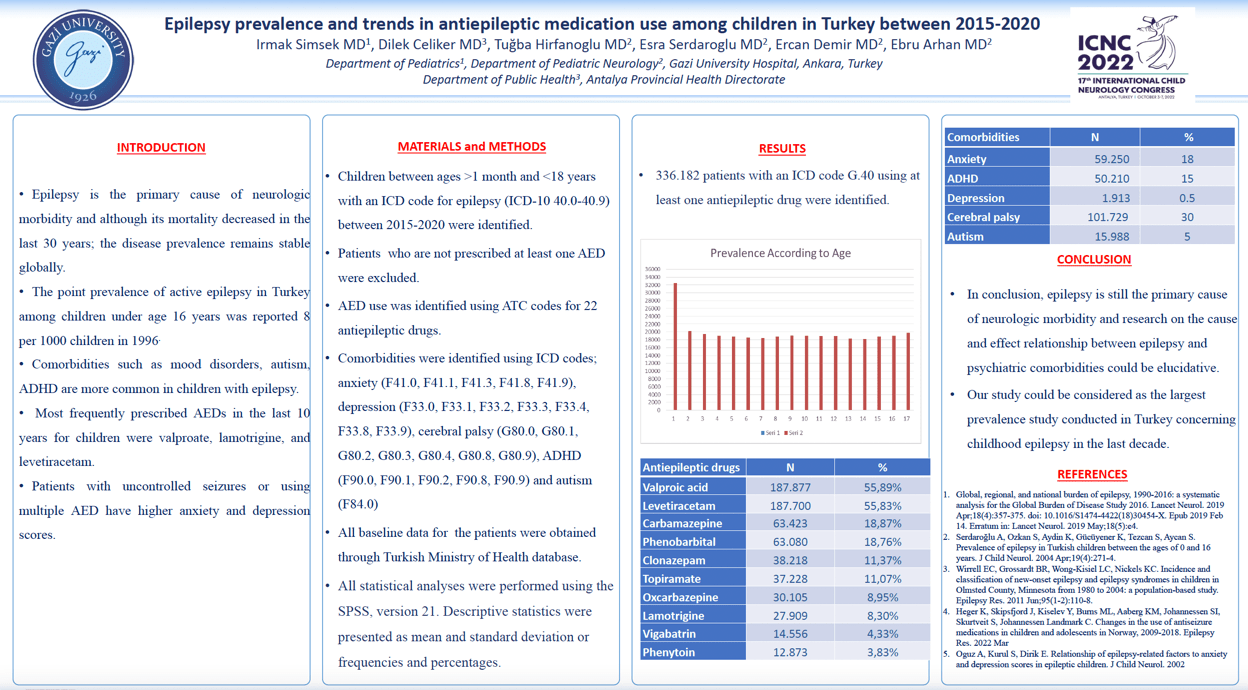Epilepsy prevalence and trends in antiepileptic medication use among children in Turkey between 2015-2020
Irmak Simsek, Dilek Yapar, Tuğba Hirfanoğlu, Esra Serdaroğlu, Ercan Demir, Ebru Arhan
Objectives: To identify the prevalence and comorbidities of epilepsy among children in Turkey. To determine trends in the antiepileptic medication use among children in Turkey. Methods: Children between ages 1 month and 18 years with a International Classification of Diseases Code for epilepsy (ICD-10 40.0-40.9) were identified using Turkish Ministry of Health database. Among these patients, antiepileptic drug use was identified using ATC codes for 22 antiepileptic medications. Patients who did not use an antiepileptic medication were excluded. Among these patients, comorbidities were exctracted using ICD codes. Results: 336.182 epilepsy patients with an ICD code G.40.0-G40.9 using at least one antiepileptic drug were identified. 148.405 (44,1%) were female and mean age was 10.9 years. 101.729(30,2%) had an ICD code for cerebral palsy, 59.250 (17,6%) for anxiety, 50.210 (14,9%) for ADHD, 15.988 (%4,7) for autism. Among 22 antiepileptic medications, 16 were prescribed. The most prescribed antiepilectic drug was valproic acid for 187.877(55,8%) patients, followed by levetiracetam for 187.700 (55,83%), carbamazepine for 63.423 (18,8%) and phenobarbital for 63080 (18,7%). Conclusion: Epilepsy and its comorbidities have a burdensome impact on patient’s life and the economic cost of antiepileptic drug use is innegligible. Recent technology allows us to conduct epidemiologic studies in Turkey. Identifying the comorbidities and multi-drug use would be crucial for the quality of life of children with epilepsy.
Keywords: epilepsy, antiepileptic, children
Irmak Simsek
Gazi University Faculty of Medicine
Turkey
Dilek Yapar
Sağlık Bakanlığı Antalya Muratpaşa İlçe Sağlık Müdürlüğü
Turkey
Tuğba Hirfanoğlu
Gazi University Faculty of Medicine
Turkey
Esra Serdaroğlu
Gazi University Faculty of Medicine
Turkey
Ercan Demir
Gazi University Faculty of Medicine
Turkey
Ebru Arhan
Gazi University Faculty of Medicine
Turkey
Objectives: To identify the prevalence and comorbidities of epilepsy among children in Turkey. To determine trends in the antiepileptic medication use among children in Turkey. Methods: Children between ages 1 month and 18 years with a International Classification of Diseases Code for epilepsy (ICD-10 40.0-40.9) were identified using Turkish Ministry of Health database. Among these patients, antiepileptic drug use was identified using ATC codes for 22 antiepileptic medications. Patients who did not use an antiepileptic medication were excluded. Among these patients, comorbidities were exctracted using ICD codes. Results: 336.182 epilepsy patients with an ICD code G.40.0-G40.9 using at least one antiepileptic drug were identified. 148.405 (44,1%) were female and mean age was 10.9 years. 101.729(30,2%) had an ICD code for cerebral palsy, 59.250 (17,6%) for anxiety, 50.210 (14,9%) for ADHD, 15.988 (%4,7) for autism. Among 22 antiepileptic medications, 16 were prescribed. The most prescribed antiepilectic drug was valproic acid for 187.877(55,8%) patients, followed by levetiracetam for 187.700 (55,83%), carbamazepine for 63.423 (18,8%) and phenobarbital for 63080 (18,7%). Conclusion: Epilepsy and its comorbidities have a burdensome impact on patient’s life and the economic cost of antiepileptic drug use is innegligible. Recent technology allows us to conduct epidemiologic studies in Turkey. Identifying the comorbidities and multi-drug use would be crucial for the quality of life of children with epilepsy.
Keywords: epilepsy, antiepileptic, children
Irmak Simsek
Gazi University Faculty of Medicine
Turkey
Dilek Yapar
Sağlık Bakanlığı Antalya Muratpaşa İlçe Sağlık Müdürlüğü
Turkey
Tuğba Hirfanoğlu
Gazi University Faculty of Medicine
Turkey
Esra Serdaroğlu
Gazi University Faculty of Medicine
Turkey
Ercan Demir
Gazi University Faculty of Medicine
Turkey
Ebru Arhan
Gazi University Faculty of Medicine
Turkey

Irmak Simsek
Gazi University Faculty of Medicine Turkey
Gazi University Faculty of Medicine Turkey